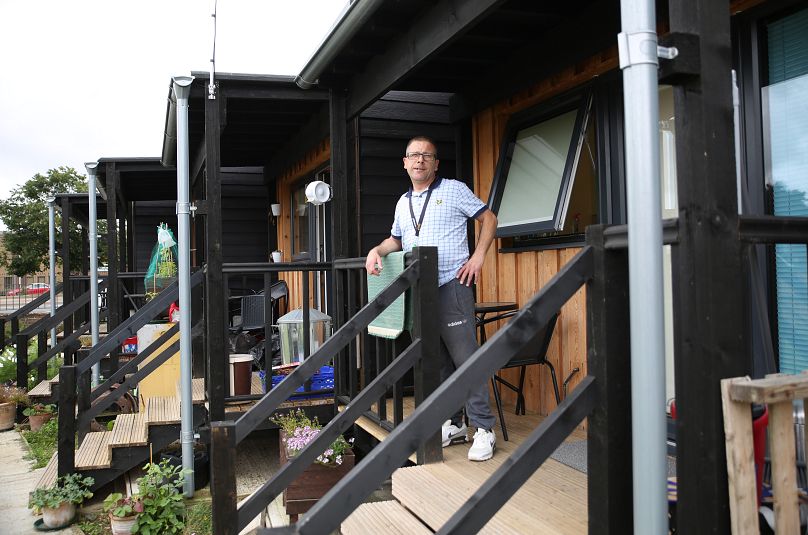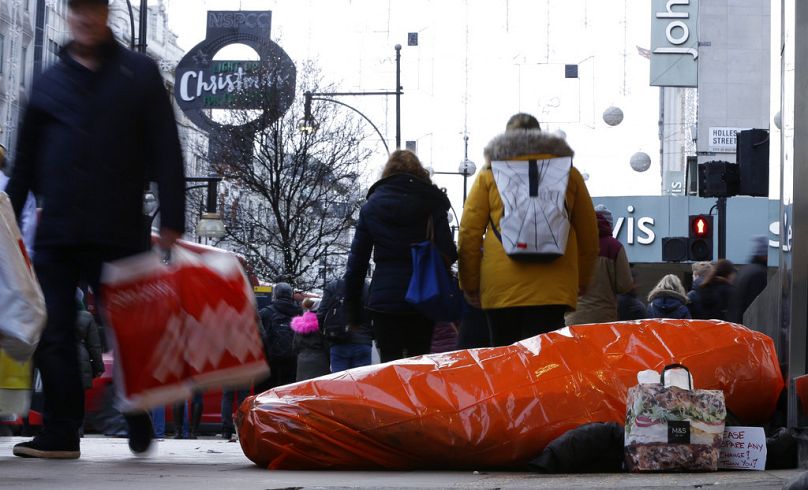Modular homes have been floated as a low-cost, high-quality housing solution to help people experiencing homelessness transition to a permanent home.
Homelessness in Europe has been on the rise for years.
 ADVERTISEMENT
ADVERTISEMENT
 ADVERTISEMENT
ADVERTISEMENT
Although figures are hard to come by – as countries have different definitions of homelessness and not every country keeps track of how many people fall under their definition – the EU Commission has found that the number of people sleeping rough is rising in nearly every member state.
Finland is one of the rare exceptions – the Nordic country has seen its homeless population decrease since 2008, when it began focussing on a Housing First strategy. Housing First is based on the principle that once a person has a home, which is permanent and secure, it’s easier for them to move forward with their lives.
While in the long-run this kind of approach has been shown to save governments money, the upfront costs are high, which has discouraged many countries from following Finland’s lead.
One of the proposed solutions to reducing the costs in the interim is modular housing, which has been used as a stepping stone in the path towards housing independence.
What are modular homes?
Modular homes are custom-built housing units designed for temporary use. They can be moved around and installed in different sites and are generally loaned out at low or no cost.
They’ve been floated as a low-cost, high-quality housing solution for people experiencing homelessness, as well as a temporary housing solution for victims of natural disasters and refugees.
They’re less expensive than building new affordable housing – modular homes generally cost 15-20% less to build than traditional, stick-built homes. Communities of modular homes are often accompanied by support services from charities that help previously homeless people get back on their feet.
In Cambridge, UK the first community of modular homes was set up in 2020 by the charity Jimmy’s Cambridge in conjunction with non-profit Allia Future Homes and the ethical building organisation New Meaning Foundation.
The homes were designed by architects to meet homeless people’s needs, using insight from charities and people who had experienced homelessness themselves, according to Lewis Herbert, manager of Allia Future Homes.
“(Modular home residents) haven’t got a great number of possessions and they need something that’s easy to manage,” Herbert told Euronews Culture. “So essentially we needed a very simple and fairly compact design of a main living room with a kitchen in the corner, in the middle room of a shower bathroom, and then the single-person bedroom at the back.
“Modular homes are there for people who are not going to be there forever because it's a stepping stone for people who were previously bouncing around back and forth between hostels and the street.”
Each unit is 25 m2 and has a small porch and garden and there were generally no more than 6 units in a community.
How do modular homes help residents?
A new study released by Cambridge University’s Centre for Housing and Planning Research and Jimmy’s found that modular homes can help some homeless people begin their journey towards a more permanent housing solution.
“Modular homes are an innovative solution to address homelessness and have brought about positive outcomes for residents,” the study concluded.
But the research suggests that housing alone won’t solve the problem and that “using modular solutions as temporary accommodation to prepare people to live independently works best where the housing offer is combined with support.”
Some of the testimonies from residents revealed that having their own space helped them find the confidence to tackle addictions and reconnect with estranged family members.
“It's a slow recovery,” CEO of Jimmy’s Mark Allan told Euronews Culture. “But if you can speak to your family and if you can stop drinking, if you can start to think about work again and finding employment, then that's a big step forward.”
Modular homes are different from the other types of temporary housing Jimmy’s offers because of the privacy that comes with it, which Allan believes is crucial for recovery.
“It gives someone their own space and their own front door so they can go home, close the door and be on their own,” he said. “That’s quite important for someone who’s in recovery from whatever it was that led them into homelessness in the first place (...) because they can just have a space to themselves.”
One of the residents told researchers: "The privacy is the best thing, you can do whatever you want to do. Sometimes it's hard to engage with other people and you need to be on your own."
Challenges still ahead
During the COVID-19 pandemic, the UK's government set an ambitious goal of ending rough sleeping in the country by 2024, but the rising cost of living has seen homelessness increase over the past year.
Some of the negative points brought up by residents living in Jimmy’s modular homes reflected their difficulties accessing support services for mental health and addiction.
All of the residents interviewed for the Cambridge study said getting a job remained difficult, even though having an address helped. Mental health services were also difficult to access in a timely manner.
"...long waiting times to receive mental health support and drug and alcohol support were reported as a barrier by some of the residents to being able to improve their health," according to the study.
Allan added that while modular homes were a great interim solution to getting people off the street, they didn't solve the problem of providing affordable long-term housing.
"It's good that these exist as an interim, affordable solution. But it isn't enough of a permanent solution. And that's the problem. There's not enough affordable housing being built."












